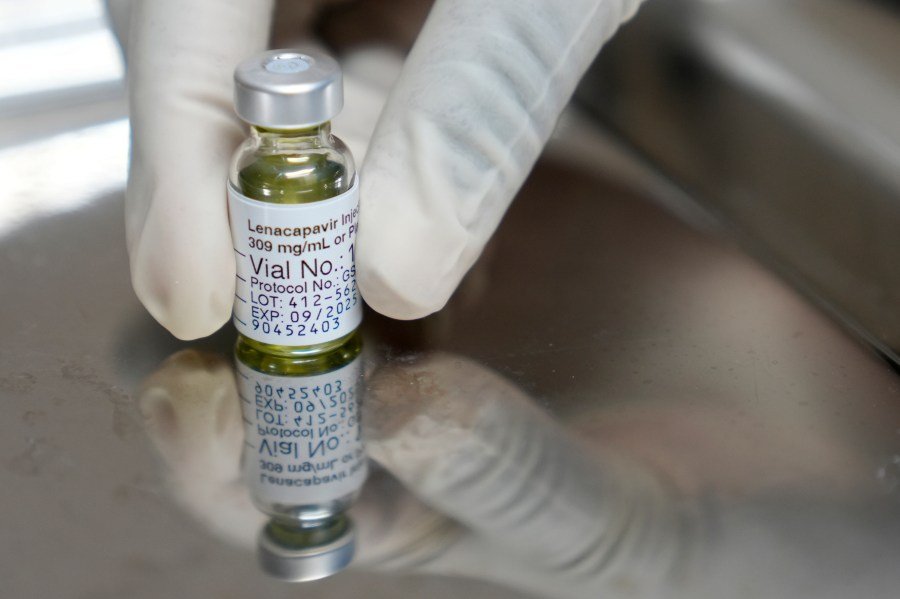AUSTIN (KXAN) — Advocates for HIV prevention are calling a newly approved injectable medication a major step in eliminating the spread of the virus.
This summer, the FDA approved Gilead’s lenacapavir, sold under the brand name Yeztugo, after clinical trials showed the drug nearly eliminated HIV transmission among participants. Unlike traditional daily oral PrEP (pre-exposure prophylaxis), the new medication is given by injection twice a year.
“This new injectable PrEP for HIV prevention is going to be a game changer for a lot of people,” said Christopher Hamilton, CEO of Texas Health Action, an Austin-based nonprofit that provides services and support for people living with HIV.
Fewer barriers to prevention
Hamilton says the twice-yearly schedule could be life-changing for people who face challenges taking a pill every day.
“For people that may have barriers to taking daily medications, maybe someone is unstably housed and trying to store medication and take it at the same time every day just isn’t possible,” Hamilton said. “You don’t have to remember a pill every single day.”
Texas Health Action’s Kind Clinic is now working on protocols to provide the injection, though Hamilton says there’s no firm timeline yet.
Insurance coverage is still uncertain
One of the biggest questions is cost. According to NBC News, each injection currently has a list price of more than $14,000, and insurance coverage for the injectable version is still developing.
“Right now it does take a medical exception, meaning your doctor has to write to the insurance company and detail the reasons why this injectable version is better for the patient than daily oral medication,” Hamilton explained.
Hamilton says that while most insurance plans cover daily oral PrEP, it could take time for them to decide whether to cover lenacapavir.
Community support and funding
Kind Clinic receives some of its funding from the Hill Country Ride for AIDS, an annual fundraiser supporting nine Central Texas nonprofits offering HIV/AIDS services and prevention.
“It’s out in Spicewood, Texas, at this beautiful place called Krause Springs,” said ride director Eli Oldham. “I’ve been lucky to be part of it for so many years.”
Oldham believes prices will drop over time, just as they did when PrEP first came to market.
“When PrEP and all those medications first started hitting the market, they were also really expensive,” Oldham said. “Hopefully, we’re in a shorter game now.”
Hamilton agrees the current cost is too high for most organizations to absorb, but says there is hope.
“It’s going to take us some time to figure out at what price we could purchase this medication, and if that’s something that would be feasible to do through donations or grants,” Hamilton said. “The good news is the manufacturer will offer a patient assistance program for people who are uninsured.”
Administered by professionals
The injection must be given by a healthcare provider, either in a doctor’s office or a specialty pharmacy.
“We’re fortunate at Kind Clinic to have pharmacies inside two of our Austin locations, so we can receive the medication and administer it on-site,” Hamilton said. “But you won’t be able to just go to your local pharmacy, take it home, and do the injection yourself.”
Clinical trials
Gilead’s large clinical trials of the drug, reported by NBC News, show it is highly effective. Here’s how the studies played out: People at risk for HIV, gay and bisexual men, and transgender people, were either given lenacapavir injections every six months or daily Truvada, a pill form of pre-exposure prophylaxis, or PrEP. Lenacapavir was 89% more effective at preventing HIV than the daily option.
A push to get connected to care
Hamilton says now is the time for anyone not already connected to care to take that step.
“If you haven’t established care with a clinic, start now. Know your status, have a routine for your sexual health,” he said. “Being connected to a provider is the best thing you can do so that organizations like Kind Clinic can help find resources to support patients through their care.”
For both Hamilton and Oldham, the arrival of this twice-yearly prevention shot is more than just medical progress; it’s hope.
“Anytime there’s a breakthrough or new treatment for HIV, it’s exciting because it’s always about the progress that’s coming,” Oldham said.









